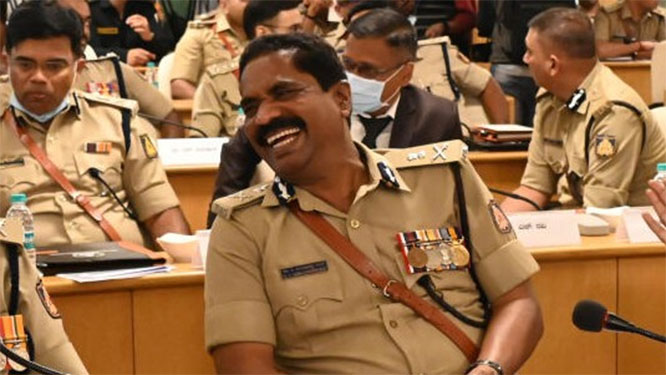
Islamabad, Aug 22: Pakistan’s former prime minister Imran Khan has been booked under the Anti-Terrorism Act for threatening police, judiciary and other state institutions at his Islamabad rally a day ago, it emerged on Sunday.
The case surfaced hours after Interior Minister Rana Sanaullah on Sunday said that the government was mulling to file a case against 69-year-old Khan over his provocative speech delivered on Saturday night in the F-9 Park of the national capital.
According to the copy of the first information report, which has been seen by PTI, the case was registered at the Margalla Police Station of Islamabad at 10pm on Saturday under Section 7 of the Anti-Terrorism Act (punishment for acts of terrorism).
The FIR reads that Khan in his speech had “terrorised and threatened top police officials and a respected female additional sessions judge” with the aim to stop them from performing their functions and abstain from pursuing any action against any individual related to his Pakistan Tehreek-e-Insaaf party.
It says that Khan’s speech had spread fear and uncertainty among the police, judges and the nation.
In his address, Khan had threatened to file cases against top police officials, a woman magistrate, Election Commission of Pakistan and political opponents over the treatment meted out to his aide Shahbaz Gill, who was arrested last week on charges of sedition.
He had also taken exception to Additional District and Sessions Judge Zeba Chaudhry, who had approved Gill’s two-day physical remand at the request of the capital police, and said she should “prepare herself as action would be taken against her”.
Earlier at a Press conference, Interior Minister Sanaullah said that the government was holding legal consultations before launching any case against Khan. He alleged that Khan’s speech was a continuation of a trend to target the army and other institutions.
“This is all happening in continuation — from a campaign after the Lasbela incident when six army officers were killed followed by Gill’s attempt to incite army ranks to go against their top command and then Imran threatening a woman judge and police officials for performing their duties as per the law,” the minister said.
His remarks came after Pakistan’s electronic media watchdog banned satellite television channels from broadcasting live speeches of Khan following his provocative address on Saturday night.
The Pakistan Electronic Media Regulatory Authority (PEMRA) in a communique issued on Saturday said that TV channels despite repeated warnings had failed to implement a time-delay mechanism to stop the broadcast of material against “state institutions”.
“It has been observed that Mr Imran Khan, Chairman Pakistan Tehreek-e-Insaf, in his speeches/statements is continuously alleging state institutions by levelling baseless allegations and spreading hate speech through his provocative statements against state institutions and officers which is prejudicial to the maintenance of law and order and is likely to disturb public peace and tranquillity,” it said.
According to the statement, after analysing the content of Khan’s speech, it has been observed that the content was aired live by the licensees without an effective time delay mechanism.
“The competent authority i.e. Chairman PEMRA in view of the above-mentioned background and reasons hereby prohibits broadcast of live speech of Khan on all satellite TV channels with immediate effect,” it added.
Reacting sharply to the ban imposed on the PTI chairman, his party said the government of Prime Minister Shehbaz Sharif has a fascist regime.
“Imported fascists are trying to ban Imran Khan’s speeches on TV. They have lost the battle completely and now using fascism; they will fail! #HelpPakistan by raising our voices against fascists!,” Khan’s party tweeted.
Saturday’s rally was organised by PTI to express solidarity with Gill and stage a protest against what Khan claimed was “blatant fascism” prevalent under the “imported regime” of prime minister Sharif.
During the rally, Khan didn’t spare powerful Army, calling it “neutrals”, and urged his supporters to stand with the nation rather than the “gang of thieves”, in a veiled reference to the coalition government.
He also lashed out at the judiciary, terming them as “biased”.
While the army has not responded to his barb, Pakistan Muslim League-Nawaz, Pakistan Peoples Party, Jamiat Ulema-e-Islam Fazl and Mutahida Quami Movement Pakistan in a statement asked the judiciary to take legal action against Khan and his aides for threatening a female judge and intimidating police officers.
Since he was ousted from power in April, the cricketer-turned politician has repeatedly claimed that the no-trust motion against him was the result of a “foreign conspiracy”.
Khan has also emphasised that his party would not deal with or accept the “imported government” headed by prime minister Sharif.
Meanwhile, a defiant Khan addressed a rally at Rawalpindi’s Liaquat Bagh ground on Sunday night.
“Now PEMRA is also in the game. What has Imran Khan done? His only crime is that he is not accepting this imported government,” Khan said responding to the PEMRA banning of his live speeches.
He also talked about the deteriorating economic situation and inflation, saying the country’s army chief had to go to countries like Saudi Arabia to get loans.
“The only way to bring the country out of the current situation is to hold fair and free elections,” he said.







Comments
Add new comment